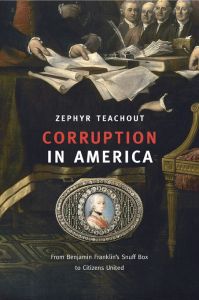The following excerpt is the introduction to Zephyr Teachout’s new book, Corruption in America: From Benjamin Franklin’s Snuff Box to Citizens United.
The Citizens United decision was not merely bad law; it was bad for politics, and displayed an even worse understanding of history. Americans from James Madison onward have argued that it is possible for politicians and citizens alike to try to achieve a kind of public good in the public sphere. The traditional view is not naive — it does not assume that people are generally public regarding. It assumes that the job of government is to create structures to curb temptations that lead to exaggerated self-interest. It certainly recognizes the power of self-interest; but instead of endorsing it, the traditional American approach makes it government’s job to temper egocentrism in the public sphere. The traditional conception implicates difficult questions: What is self-orientation and public orientation, and what is the public good? But it does not discard these distinctions because they are difficult ones to parse. A classical American approach engages the complexity. Like liberty, speech or equality, corruption is an important concept with unclear boundaries. It refers to excessive private interests in the public sphere; an act is corrupt when private interests trump public ones in the exercise of public power and a person is corrupt when they use public power for their own ends, disregarding others.
Corruption in America is my effort to fill in the history that Citizens United ignored. It provides a previously neglected story of the use of the concept in American law and a much-needed account of the different kinds of meanings attached to it throughout the political life of the country. I show that for most of American history, courts remained committed to a broad view of corruption. The book draws primarily upon the texts used by lawyers: the Constitutional Convention, cases and statutes. It shows how, starting in the late 1970s, everything began to change around this issue.
The Supreme Court, along with a growing subset of scholars, began to confuse the concept of corruption and throw out many of the prophylactic rules that were used to protect against it. This rejection has led to an overflow of private industry involvement in political elections and a rapid decline in the civic ethic in Congress and the state houses. The old ideas about virtue were tossed out as sentimental, but the old problems of corruption and government have persisted. Interest-group pluralists who reject these ideas do not, I believe, have an answer to the problem of corruption and in fact have been part of the problem.
The contemporary era is full of proverbial diamond-encrusted gifts, although they are less likely to come from the king of France. Instead, they come from the lords of highly concentrated, monopolistic industries who, like the king of France in 1785, have an intense and personal interest in the political choices of the legislative branches and a casual disregard for the civic process.
Candidates are dependent upon the gifts of wealthy individuals in the form of campaign contributions and businesses in the form of independent political expenditures. The impulse to resist these presents is a deeply American one, going all the way back introduction to the founding. But in order to protect this resistance, we will need tools and approaches that are alien to the modern law and economic transactional understandings of corruption.
The book argues that prophylactic rules designed to limit temptations are not a backwater but a cornerstone of what is best in our country. In our modern prosecutorial culture, one might be tempted to think that white-collar bribery laws, which I categorized as “corrupt intent” laws, would be the appropriate tool for fighting corruption. But they are problematic. If a bribery statute is narrowly drawn (or interpreted), it covers only brazen, unsophisticated exchanges and does not actually solve problems of money being used to influence policy and undermine representative government. A narrow law will punish only clumsy politicians like William Jefferson, who hid his rolls of cash in a freezer.
More broadly interpreted corrupt intent laws are troubling for the opposite reason: since they proscribe giving a “thing of value” with “intent to influence” governmental action, they can be used to punish political enemies. By their terms, they can even cover a politician’s promise to help a teachers’ group in exchange for an endorsement. A criminal law “War on Corruption” is arguably like the wars on drugs or terror — nearly impossible to win in arraignments.
Corruption is far better fought through changing basic incentive structures. This might seem intuitive to anyone involved in politics, but the majority of the current Supreme Court openly prefer bribery laws to prophylactic campaign spending limits: one of their justifications for striking down campaign finance rules is that corrupt intent laws provide better protection.
I seek to enrich the way American judges, scholars and citizens imagine the concept of corruption and its relationship to our legal system. The book challenges four commonly held misconceptions: that corruption law began in the post-Watergate era, that criminal bribery law is the dominant sphere in which corruption law plays out, that bribery law is coherent and consistent and that quid pro quo is the heart of corruption law. A deeper understanding of the tradition of corruption can enrich our civic culture and our laws.
If the Supreme Court can better remember our past, it might overturn dozens of cases that have limited the capacity of elected legislatures to make their own experiments in democracy. And if we, as citizens, can remember our past, it could augment the way we think about our founding principles. What if we could add “anti-corruption” to citizens’ sense of national identity?
From Corruption in America: From Benjamin Franklin’s Snuff Box to Citizens United by Zephyr Teachout. Copyright © 2014 by the President and Fellows of Harvard College. Used by permission. All rights reserved.




